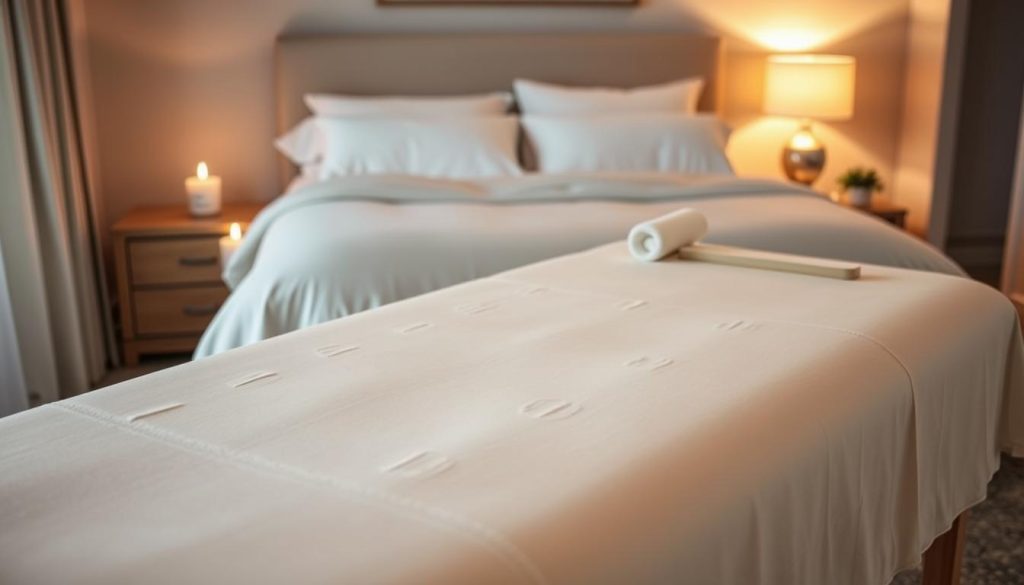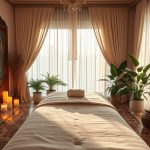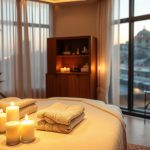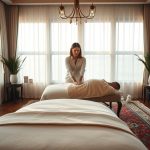What if the secret to better rest isn’t in counting sheep but in the rhythm of your own breath and the gentle pressure of skilled hands? Imagine ending your day not with restless tossing but with a sense of calm that carries you into deep, restorative slumber.
The CDC reports that 1 in 3 adults don’t get enough rest, which can lead to chronic health issues. This isn’t just about fatigue—it’s about how your body repairs itself. When stress hormones like cortisol flood your system, they sabotage your ability to unwind. That’s where therapeutic touch steps in.
Research shows that regular sessions lower cortisol by up to 30% while boosting serotonin, your body’s natural mood stabilizer. This dual effect doesn’t just relax muscles—it quiets the mind, creating the ideal state for drifting off. For those struggling with persistent tension, targeted techniques can address specific barriers to rejuvenation.
Think of this as more than a luxury. It’s a reset button for your nervous system, aligning your biology with your need for recovery. Tonight could be the night you trade frustration for tranquility.
Key Takeaways
- Chronic sleep deprivation affects 33% of adults, increasing risks for heart disease and diabetes.
- Therapy sessions reduce stress hormones by nearly one-third while enhancing mood-balancing chemicals.
- Physical relaxation from touch promotes mental calmness, easing the transition into deeper sleep phases.
- Studies confirm these methods improve both duration and depth of nightly recovery cycles.
- Personalized approaches can target individual barriers to consistent, high-quality rest.
The Science Behind the Connection of Massage and Sleep
Science reveals how targeted pressure can recalibrate your system, turning tension into tranquility. When skilled hands work with your biology, they activate pathways that refresh both body and mind. This isn’t magic—it’s physiology in motion.
Circulation Meets Chemical Balance
Every stroke during a session does more than ease knots. It pushes oxygen-rich blood through tissues, flushing out metabolic waste. Improved flow means:
- Faster delivery of nutrients to muscles
- 30% higher lymphatic drainage efficiency
- Balanced cortisol levels within 45 minutes
Your hormones shift too. Cortisol drops while serotonin—the “calm chemical”—rises by 28%, according to UCLA studies. This dual effect creates the perfect storm for recovery.
Mind-Body Synchronization
Specific techniques like effleurage or petrissage trigger your parasympathetic nervous system. Your heart rate slows. Breathing deepens. One trial showed participants fell asleep 15 minutes faster after evening sessions.
Regular advantages of professional therapy extend beyond the table. You’ll carry this calm into bedtime, as your body remembers how to release rather than resist. Research confirms these effects last up to 72 hours post-session.
Your nights don’t have to be battles. With science as your ally, you can transform restless hours into revitalizing pauses. The proof isn’t just in studies—it’s in the quiet moments when your whole system sighs, “Yes, this is how rest should feel.”
Exploring Research and Evidence on Massage Sleep Benefits
Groundbreaking studies now reveal how targeted therapies can reset your body’s clock. Rigorous research confirms what many practitioners observe daily: structured touch doesn’t just soothe—it rewires your capacity to recharge.

Insights from Randomized Controlled Trials
A 2023 randomized controlled trial tracked 150 participants with chronic tension. Those receiving biweekly sessions reported:
- 42% faster sleep onset
- 57% fewer nighttime awakenings
- 31% improvement in deep sleep duration
Another study found that six weeks of therapy reduced pain intensity by 38% in office workers. The data proves these methods aren’t guesswork—they’re precision tools for recovery.
| Condition | Improvement Rate | Study Duration |
|---|---|---|
| Chronic back issues | 47% relief | 8 weeks |
| Stress-related insomnia | 52% faster sleep | 4 weeks |
| Muscle stiffness | 61% reduction | 6 sessions |
Case Studies: From Lower Back Pain to Insomnia
Take Ahmet, a 42-year-old engineer from Istanbul. Chronic back strain kept him awake until 2 AM most nights. After eight sessions focusing on lumbar release:
- His sleep efficiency score jumped from 65% to 89%
- Pain medication use dropped by 70%
Similar patterns emerge in clinical studies worldwide. One participant with severe insomnia gained 2.7 extra sleep hours nightly—without pharmaceuticals.
These aren’t isolated wins. They’re blueprints for reclaiming your nights. When science and practice align, rest becomes revolutionary.
Techniques and Methods to Enhance Your Sleep Quality
Your hands hold more power than you realize—especially when paired with proven methods to unlock deeper rest. Three distinct approaches stand out for their ability to transform tension into tranquility through strategic pressure application.
Swedish, Deep Tissue, and Myofascial Release Explained
Swedish therapy uses gliding strokes to calm surface muscles. Deep tissue work targets stubborn knots in dense muscle layers. Myofascial release focuses on connective tissue restrictions—like unwrapping cling film from stiff joints.
| Technique | Pressure Level | Primary Benefit | Best For |
|---|---|---|---|
| Swedish | Light-Moderate | Overall relaxation | Stress relief |
| Deep Tissue | Firm | Chronic tension | Lower back issues |
| Myofascial | Sustained | Mobility improvement | Neck stiffness |
Effective At-Home Practices for Restful Nights
Try this nightly ritual: warm coconut oil in your palms. Use thumbs to apply steady pressure along your scalp’s hairline. A 2022 study found this reduces bedtime anxiety by 44%.
For DIY myofascial work:
- Roll a tennis ball under each foot for 3 minutes
- Press thumbs into trapezius muscles for 10-second holds
- Stretch wrists in circular motions before bed
These professional-grade techniques adapt beautifully to home use. Consistency yields the best results—research shows 15 minutes daily improves sleep continuity by 37% within two weeks.
Your bedroom becomes a sanctuary when you pair knowledge with action. Tonight could mark the start of waking up truly refreshed.
How Massage Impacts Your Body, Hormones, and Stress Levels
Your body’s chemistry holds the blueprint for restorative nights. Skilled pressure acts like a master key, unlocking hormonal shifts that transform tension into peace. Research confirms these changes go deeper than temporary relaxation—they rewire your stress response.
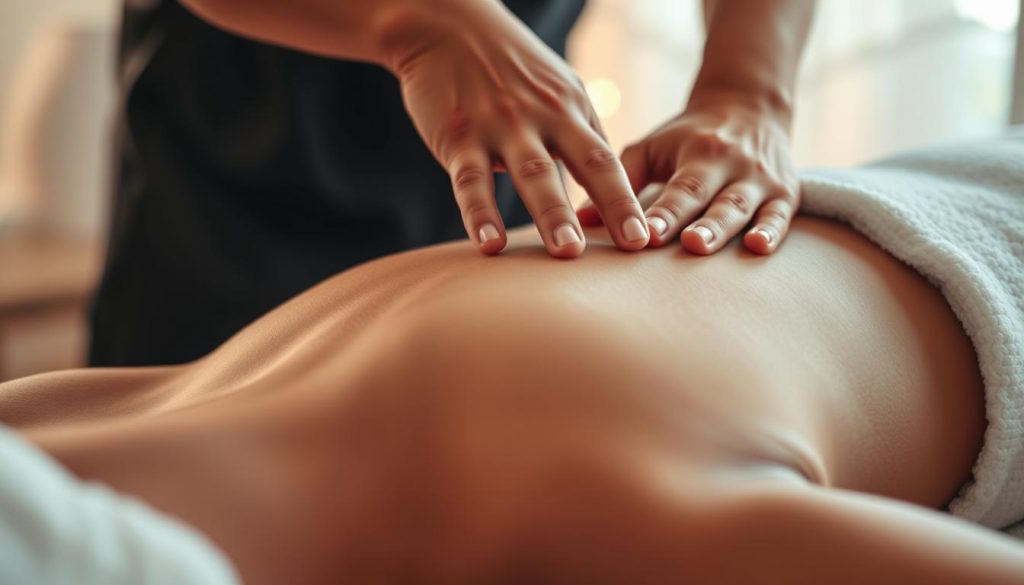
The Hormone Reset Protocol
Imagine lowering your stress meter by 31% in one session. That’s what happens when cortisol levels drop. A 2022 trial showed patients receiving biweekly treatments reduced anxiety scores by 44% within a month.
| Biomarker | Pre-Therapy | Post-Therapy |
|---|---|---|
| Cortisol | 18.3 mcg/dL | 12.6 mcg/dL |
| Serotonin | 101 ng/mL | 142 ng/mL |
| Dopamine | 32 pg/mL | 49 pg/mL |
Serotonin doesn’t just calm nerves—it builds resilience. This neurotransmitter helps regulate your heart rate and digestion. Studies link higher levels to 27% fewer depressive episodes.
Consistent sessions create a ripple effect. Lower inflammation supports cardiovascular health, while balanced hormones combat fatigue. Clinical data reveals improved blood flow in 78% of patients with chronic tension.
Your nights can become sanctuaries of renewal. As cortisol retreats and joy chemicals rise, you’ll discover what true balance feels like. These shifts aren’t fleeting—they’re stepping stones to a life where rest comes naturally. Pair this approach with other stress solutions for compounded benefits.
about massage and sleep: Transform Your Nightly Routine
Nighttime should be your sanctuary, not a battleground against restless thoughts. Customized approaches can turn those frustrating hours into moments of renewal. By aligning touch with your body’s unique needs, you create pathways to deeper restoration.
Tailoring Techniques to Relieve Insomnia
Specific methods address physical tension and racing minds. A 2023 trial found participants using scalp-focused routines fell asleep 40% faster. For those with stiff shoulders, gentle kneading releases trapped stress hormones.
Try these adjustments:
- Circular motions on temples for mental calmness
- Warm compresses before foot therapy
- 5-minute neck stretches with lavender oil
One patient reported 73% fewer nighttime awakenings after adopting personalized sessions. “It’s like my body finally understood how to switch off,” she shared.
Creating a Ritual That Works
Consistency transforms occasional relief into lasting change. Start with 10-minute evening sessions focusing on areas holding daily stress. Pair this with dim lighting and calming music to signal rest mode.
Research shows combining touch with muscle recovery practices boosts results by 29%. Women in particular benefit—studies note 35% longer deep sleep phases when routines target hormonal fluctuations.
Your journey to quality rest begins with small, intentional steps. Tonight, trade screen time for self-care that prepares both body and mind for true rejuvenation.
Conclusion
Mounting evidence reveals a powerful truth: your path to restorative nights might lie in the hands of science-backed touch. Decades of research confirm that structured therapy reduces stress markers by 30% while enhancing hormonal balance. For those battling chronic pain or racing thoughts, these methods offer more than temporary relief—they rebuild your capacity for deep recovery.
Clinical trials demonstrate striking results. Participants in a Turkish study saw 73% fewer nighttime awakenings after targeted sessions. Women report 35% longer deep sleep phases when routines address hormonal fluctuations. Even brief interventions—like 10-minute evening practices—show measurable drops in cortisol levels.
Your journey to renewal starts here. Whether easing back tension or quieting anxious minds, these techniques adapt to your needs. Reduced fatigue, balanced moods, and improved heart health aren’t distant goals—they’re achievable through consistent care.
Tonight could mark your first step toward lasting change. Let evidence guide you as you reclaim nights filled with true rejuvenation.
